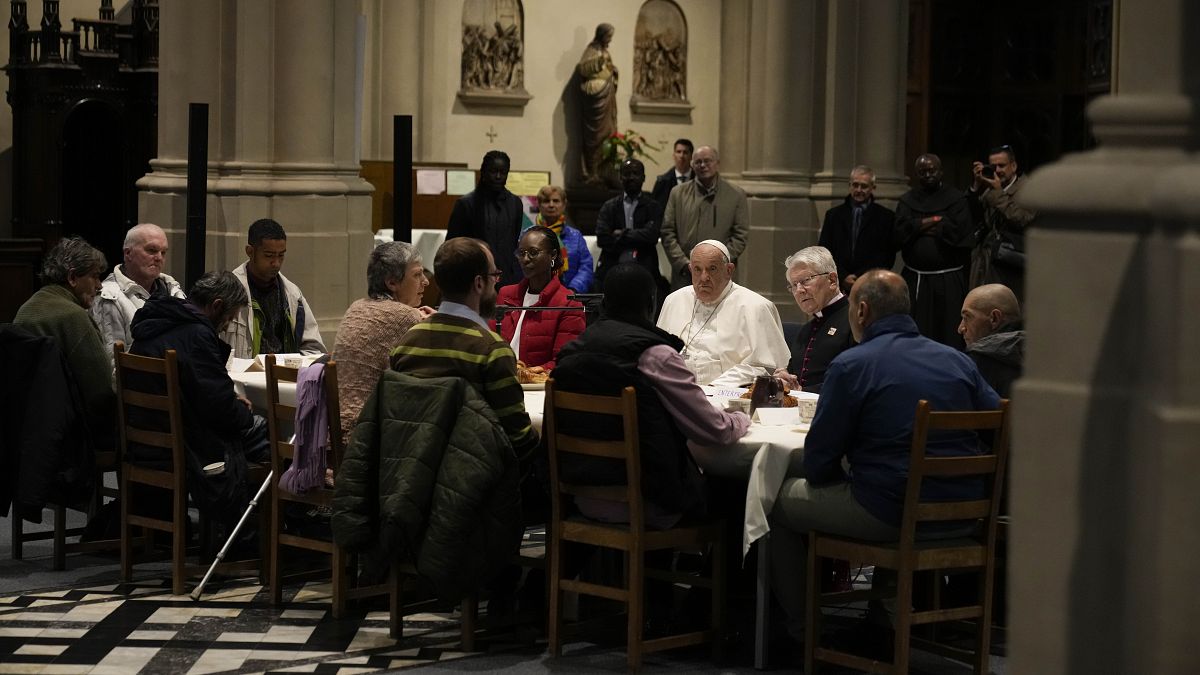Pope Francis made a surprising visit to Saint Gilles during his trip to Belgium, where he met with homeless and undocumented people in the church. In a spontaneous change to his schedule, the Pope engaged with 10 individuals over croissants and coffee, learning about their experiences and challenges. The group gifted Pope Francis with four bottles of beer made by the parish, raising funds for charity. Among the attendees was a migrant who had lost his faith after a difficult journey but found it again through the encounter with the Pope. Father Benjamin Kabongo, a Franciscan friar, noted the importance of the Pope’s gesture in listening to these marginalized individuals.
Shortly after his visit to Saint Gilles, Pope Francis proceeded to the Koekelberg Basilica of the Sacred Heart, where he addressed local bishops, priests, and the Catholic community. The Pope faced public criticisms from Belgian officials, including the king, prime minister, and the rector of Leuven Catholic University. The criticisms highlighted the church’s cover-up of clergy sexual abuse and its lack of response to the demands of women and LGBTQ+ Catholics for inclusion in the church. During the meeting with survivors of abuse, single mothers forced to give up their children, and other affected individuals, Pope Francis expressed remorse, asked for forgiveness, and pledged to prevent such abuses from happening again.
The Pope’s visit to Belgium is part of his four-day trip to Luxembourg and Belgium, during which he engaged with marginalized individuals, addressed criticisms, and sought to renew the Church’s moral authority. His encounters with the homeless, survivors of abuse, and other affected individuals underscore his commitment to listening to those who are often overlooked. While facing challenges and criticisms, Pope Francis responded with humility, acknowledging the mistakes of the past and committing to reform within the Church. His visit to Saint Gilles and the subsequent meetings with survivors and Belgian officials highlight his dedication to fostering healing, reconciliation, and accountability within the Catholic Church.
Pope Francis’ visit to Saint Gilles and subsequent engagements in Belgium exemplify his approach to leadership, emphasizing compassion, humility, and a commitment to addressing difficult issues within the Church. His spontaneous meeting with homeless and undocumented individuals showcased his willingness to engage with marginalized communities and listen to their stories. The Pope’s response to criticisms from Belgian officials demonstrated his openness to dialogue and reform, acknowledging past mistakes and working towards a more inclusive and accountable Church. Despite facing challenges and criticisms, Pope Francis remains dedicated to promoting healing, reconciliation, and justice, both within the Catholic Church and in society at large.
In conclusion, Pope Francis’ visit to Saint Gilles and Brussels during his trip to Belgium highlighted his commitment to engaging with marginalized communities, addressing criticisms, and fostering healing within the Catholic Church. His interactions with homeless and undocumented individuals, survivors of abuse, and Belgian officials reflect his emphasis on compassion, humility, and accountability in leadership. Through these encounters, the Pope demonstrated his willingness to listen, learn, and respond to the challenges facing the Church and society. As Pope Francis continues his journey, his actions in Belgium serve as a reminder of the importance of empathy, dialogue, and reform in pursuing justice, reconciliation, and renewal within the Catholic Church and beyond.










